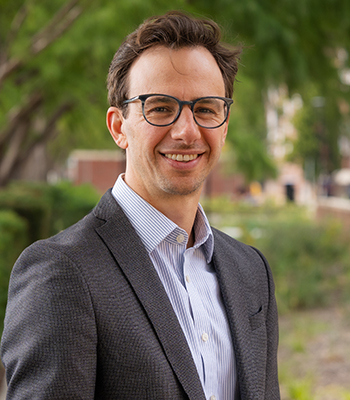
Sep 25, 2025 Business Administration Faculty Research in Education
Douglas Hannah joins Gies Business to study change in action

Douglas Hannah has always been building things. Whether it's an organization, a research project, or a mountain biking club, he loves tinkering with new ideas.
"I've always been in situations where I'm working with people to do things and build things," he said. "Sometimes that's as an entrepreneurship researcher and teacher, sometimes it's in venture settings, but oftentimes it's in all of the different organizations that make our lives and society work."
This fall, Hannah joined Gies College of Business as an associate professor of business administration. Hannah earned his PhD in Management Science and Engineering at Stanford and has held faculty positions at the McCombs School of Business (UT Austin) and Questrom School of Business (Boston University). Gies Business is a fitting next step for a scholar like Hannah, whose research focuses on strategy and entrepreneurship: how people organize to have an impact.
"Entrepreneurship, for me, is about understanding how people come together to create change in the world," he said. "It's about how they work together, and how they turn what's in their heads into real-world impact."
That interest has taken him into industries and organizations amid transformations. Hannah has studied the rise of social media and the advertising industry, the rapid growth of the solar industry, and more. For him, moments of disruption are rich ground for academic study.
"In moments of change with new possibilities, you have this brief window where, if you act, you can do something incredible," Hannah said. "But you also might have no idea of what you're supposed to do, and you have no idea if it will even work. And you need to figure it out - quickly."
Hannah is drawn to those times of emergence and disruption because they're rich with possibility and ambiguity. They're also great examples of where his preferred methods shine. While most of his work relies on field research, he also draws on modeling and insights from fields like economics and psychology.
"I'm a field researcher. I go into organizations, I observe, I interview, I collect data, and I try to abduct patterns about what's going on," he said. "Fundamentally, my job is to explain new phenomena."
His hands-on approach to research reflects a broader commitment: that research should be useful and accessible.
"I enjoy just knowing, taking things apart to see how they work just for the sake of understanding," Hannah said. "But a part of my work I'm proud of is understanding what we can really do with my research. Someone should be able to pick up even one of my papers and say: I understand this better."
Practicality and openness also shape how he works with colleagues. A collaborative and interdisciplinary culture was a factor in his decision to join Gies Business.
"Research is not a solitary activity for me," he said. "I'm always in the office, interacting with colleagues, because this is the kind of job where you can sit alone and do a lot of thinking. But I'm a guy who wants to talk through things. I want to learn from people, find the interesting angles between what we work on."
Beyond its collaborative environment, Hannah was excited to join Gies' culture of innovation - particularly its approach to rethinking models of education. And Hannah is jumping right in, teaching in Gies' fully online MBA program - the iMBA. He co-teaches MBA 553, a core entrepreneurship course, which reaches more than 700 students each semester.
"What excites me about Illinois isn't just that it's making education more accessible, but it's also rethinking what education can be, and how it fits in students’ lives. They can apply what they learn immediately. Thousands of students still working, progressing their career paths, taking what they're learning on a Thursday morning and putting it into action in their companies or lives on a Thursday afternoon."
That focus on expanding access to quality business education was a perfect match for his own research interests - an institution at the front of a changing field for a researcher who specializes in studying moments of change. He's at home in the unknown: a market in upheaval, a fledgling organization taking shape, an educational system in transition.
"Illinois is out in front in this moment," he said. "The opportunity to join that, you can't turn that down when it comes."
